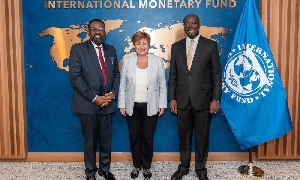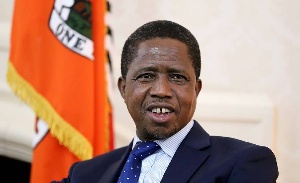- General News
- Crime & Punishment
- Politics
- Regional
- Editorial
- Health
- Ghanaians Abroad
- Tabloid
- Africa News
- Religion
Politics of Sunday, 27 April 2025
Source: www.ghanawebbers.com
IMF commends Ghana’s strong commitment to the Fund-supported program
The International Monetary Fund (IMF) has praised Ghana for its commitment to a fund-supported program.
IMF Director Kristalina Georgieva made this statement during the Spring IMF-World Bank Meeting last week.
She met with Ghana's Finance Minister and the Governor of the Bank of Ghana.
The Finance Minister shared this news on social media, stating, “Today at the #IMFmeetings, I had an excellent meeting with IMF Managing Director Kristalina Georgieva, alongside Dr. Johnson Asiama.”
Georgieva commended Ghana’s strong commitment to the program and ongoing reforms.
She noted these efforts aim to restore macroeconomic stability in the country.
The Finance Minister expressed gratitude for the IMF’s support in Ghana’s economic recovery.
He highlighted key measures taken since assuming office:
First, they have commissioned audits by the Auditor-General and oversight bodies. This will assess all outstanding payables and commitments within eight weeks.
Second, they are amending the Procurement Act. This change requires prior authorization from the Finance Minister for central government procurement.
Third, amendments to the Public Financial Management Act are being introduced. These include a debt rule aiming to reduce debt-to-GDP ratio to 45 percent by 2035.
Additionally, there will be a requirement for a primary surplus of at least 1.5 percent of GDP annually.
An Independent Fiscal Council will also be established to oversee adherence to these fiscal rules.
Fourth, a Compliance Desk has been set up at the Ministry of Finance. This desk will monitor compliance with fiscal commitments under the PFM Act.
Lastly, they plan to publish a Public Financial Management Commitment Control Compliance League Table soon. This table will rank MDAs based on their financial control compliance levels.
The Finance Minister emphasized that these reforms go beyond meeting IMF targets. They aim to restore trust in public finances and ensure credibility in budgeting processes.
Many structural reforms expected by late 2024 or early 2025 have already been implemented.











